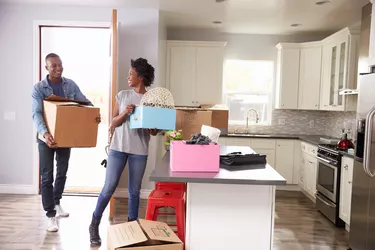
Home equity is your net worth in a property. Another perspective is that it is the difference between your home's market value and what you owe on a mortgage. You begin building home equity at the time of your first mortgage payment, though certain factors can expedite or delay the process of achieving 100 percent equity or home ownership.
Initial Home Equity
Video of the Day
Unless you participate in a loan program that allows for no money down financing, you establish some equity in the home at the time of closing. On a conventional loan, it is standard to pay 20 percent toward the purchase price. If the home is $150,000, for instance, you would pay $30,000 down and have $120,000 financed. Your home equity equals your upfront payment, according to Bankrate.
Video of the Day
Paying Down Your Loan
Beginning with your first mortgage payment, you build equity beyond your initial down payment amount. Each mortgage payment includes amounts that go toward principal and interest. The process of building equity normally begins slowly. A home loan amortization schedule is structured such that earlier payments go more toward interest than principal. Only as you reduce your principal balance do you start to see higher amounts go toward principal.
On a 30-year loan with a fixed interest rate of 5 percent, your monthly payments are $644.19. Month one, $144.19 of your payment goes toward principal and $500 goes toward interest. If you started with $30,000 in equity, your equity after one month is $30,144.19. The next month, the principal amount increases to $144.79 because the loan balance is slightly reduced after month one. When you reach payment 360 at the end of the loan term, $641.52 goes toward principal and just $2.67 is paid in interest.
Tip
To expedite the process of building equity, pay as much extra as you can toward principal each month, advises HSH Associates. You could take several years off a 30-year loan just by paying $10 or $20 extra per month.
Benefit from Home Price Appreciation
The other way in which homeowners build equity is through home price appreciation. If your $150,000 home increases in value to $165,000 after 10 years, for instance, you've achieved a $15,000 equity boost. Assume you paid off $30,000 of your $120,000 mortgage by that point as well. Thus, your equity value is the current market value of $165,000 minus the $90,000 left on your home loan, which equals $75,000.
As with paying off your loan, there is no exact timeline for building equity this way. In some high-demand areas, home values appreciate quickly. In other markets, they remain flat or grow gradually over the long run. You can enhance your home's value and build equity faster through repairs, remodels and renovations, including:
Cleaning and repair overhaul - HSH noted that simply updating the entire inside and outside look of your home often has the most significant effect on a home's value.
Kitchen and bath remodels - Updating high-traffic rooms in the home, such as a kitchen or bath, can boost your home's value and equity quickly.
Repairs and upgrades - New flooring, exterior side, interior and exterior painting, and updated plumbing and electrical are all significant equity-boosting projects.